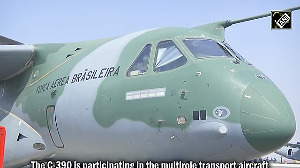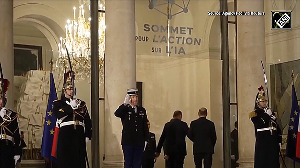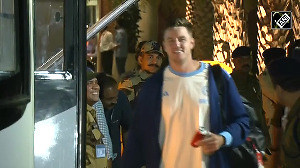Unlike the past coverage of prime ministerial trips in Washington, Manmohan Singh's state visit has hogged the headlines of American newspapers.
There have been complaints earlier that visits of Indian prime ministers in Washington, be it Indira Gandhi, Rajiv Gandhi, P V Narasimha Rao or Atal Bihari Vajpayee received scant media attention.
It may be recalled that American dailies took note of the visit of Rao, the original author of the economic reforms, by publishing a photograph on the inside pages.
But Singh hit the front pages on Tuesday with The Washington Post giving prominence to his visit, taking note of President George W Bush's move to reverse the policy on sharing civilian nuclear technology with India.
The New York Times said, "The accord with Dr Singh was remarkable in another respect: It comes only a few years after the world was genuinely concerned that it had little leverage with India and Pakistan to pull them back from the brink of nuclear confrontation."
The Washington Times also had a report on the tastefully decorated State Dining Room, where Bush held the fifth State Banquet of his presidency and the first in his second term.
The reports also carried criticism by some Congressmen of the agreement on civilian nuclear cooperation.
Edward J Markey (Democrat-Massachusetts) condemned the agreement as a 'dangerous proposition and bad non-proliferation policy' and said he would introduce a legislation to block it.
Earlier on Tuesday, as Dr Singh entered the hall, American parliamentarians presented a standing ovation with many of them enthusiastically shaking hands with him as he waded through them to reach the dias.
Among those shaking hand with him was Hillary Clinton, wife of former president Bill Clinton.
Dr Singh acknowledged the greetings by nodding his head and beginning his speech with: "I thank you from the core of my heart. I bring greetings and good wishes of our Parliament members and the entire Indian people."
The applause at the end of his speech was more impressive as Senators and Congressmen cheered continuously for two minutes. Acknowledging the gesture with a smile and nods, an apparently touched Dr Singh was heard asking the Chair
"Can I go round (in the hall?)"
He climbed down the dias and went around shaking hands with the lawmakers again. A lawmaker was seen forwarding some paper on which Dr Singh wrote something.
Dr Singh, who delivered an uninterrupted address, except for the punctuations marked by cheering, also deviated a bit from his prepared speech.
In his speech, Singh said a transformation in Indo-US relationship required the support of all sections of society and 'the India Caucus can join hands with the government on both sides, not just in removing misperceptions and stereotypes of the past, but also in pooling our collective efforts to realise the hopes with which our two countries now view this partnership'.
Referring to terrorism, Dr Singh said India and the US 'face a common threat from global terrorism' which 'does not merely threaten our security, but is also an assault on decency and our values'.
Pointing out that India was one of the fastest growing economies, he said, "Such an economy is in the long term interests of US trade and business. Rising income levels and purchasing power in India have created demands for American products and services."
About the gap in the bilateral trade balance, Dr Singh said, "If the United States plays to its strengths, that could easily
narrow." In this context, he pointed out that US exports grew by almost 45% as compared to Indian export growth rate of 15% in 2005.
Dr Singh said if India's current economic growth is sustained, it would 'impact for the better on our neighbourhood'.
"We look forward to the process of economic development transforming the nature of political discourse in our region," Singh said.






 © 2025
© 2025